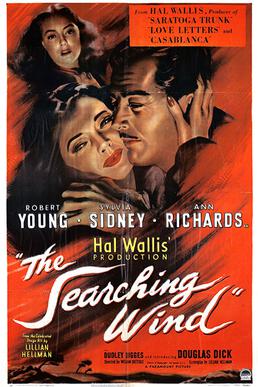Top Qs
Timeline
Chat
Perspective
The Searching Wind
1946 film by William Dieterle From Wikipedia, the free encyclopedia
Remove ads
The Searching Wind is a 1946 American drama film directed by William Dieterle and starring Robert Young, Sylvia Sidney, and Ann Richards. It is based on the play of the same name by Lillian Hellman.[1] It had originally been planned for producer Hal Wallis to make the film at Warner Bros., but after he left the studio he brought the project to Paramount Pictures.[2]
Remove ads
Plot
In 1945, after hearing of the death of Mussolini, an American career diplomat and his family reflect on his mistakes he made during the interwar years.[3]
Cast
- Robert Young as Alex Hazen
- Sylvia Sidney as Cassie Bowman
- Ann Richards as Emily Hazen
- Dudley Digges as Moses
- Douglas Dick as Sam Hazen
- Albert Basserman as Count Von Stammer
- Dan Seymour as Torrone
- Ian Wolfe as Sears
- Marietta Canty as Sophronia
- Norma Varden as Mrs. Hayworth
- Charles D. Brown as Carter
- Don Castle as David
- William Trenk as Ponette
- Mickey Kuhn as Sam as a Boy
Original play
Hellman's play debuted on Broadway in 1944 and ran for 318 performances. Montgomery Clift was in the original cast which was directed by Herman Shumlin.[4]
Hellman later said it was "The nearest thing to a political play" she had written "which is probably why I don't like it much any more. But even there I meant only to write about nice, well born people who, with good intentions, helped to sell out a world."[5]
Opening Night Cast
- Edgar Andrews as First Waiter
- Montgomery Clift as Samuel Hazen
- Joe De Santis as Second Waiter
- Dudley Digges as Moses Taney
- Eugene Earl as James Sears
- Mercedes Gilbert as Sophronia
- Alfred Hesse as Ponette
- Dennis King as Alexander Hazen
- Walter Kohler as Hotel Manager
- Arnold Korff as Count Max von Stammer
- Eric Latham as Edward Halsey
- Barbara O'Neil as Catherine Bowman
- William F. Schoeller as Eppler
- Cornelia Otis Skinner as Emily Hazen
Production
Hal Wallis bought the screen rights for $100,000. Wallis had made a film of Hellman's Watch on the Rhine while head of Warner Bros. Hellman did the script. It was one of the first films Wallis made as a producer at Paramount.[6]
Richards' casting was announced in September 1944. Joseph Cotten turned down the male lead.[7][8]
Filming started 13 December 1945.[9]
Reception
Variety thought the film "isn't likely to hold the run-of-the-mill entertainment-goer looking for escapist stuff" and "should earn back its coin... for though well-mounted, it nevertheless doesn't appear too heavily budgeted. The film is an improvement on the Broadway play... because it is more coherent, and better acted."[10]
References
Bibliography
External links
Wikiwand - on
Seamless Wikipedia browsing. On steroids.
Remove ads

